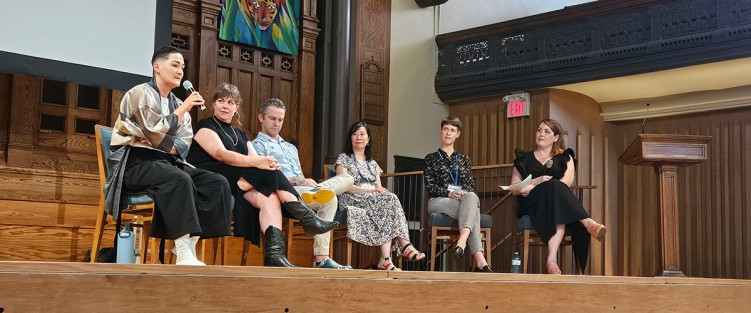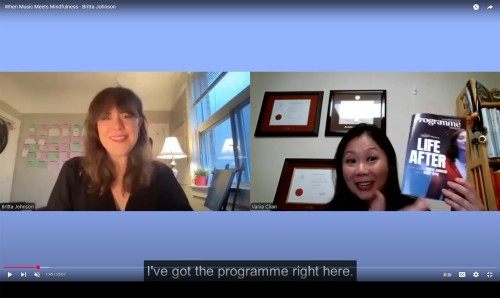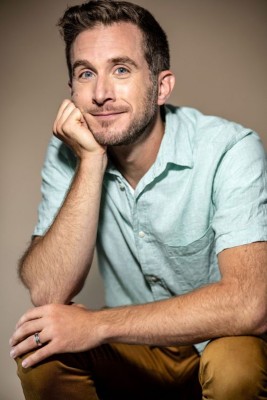 The International Congress of Voice Teachers (ICVT) is a grand event that occurs every four years, much like the Olympics. This past summer it was Toronto’s turn, with “Voices Uplifted” as the 2025 congress theme. Co-hosted by the National Association of Teachers of Singing (NATS), The Royal Conservatory, and the University of Toronto Faculty of Music, voice professionals from around the globe gathered here to share knowledge that would advance the field of voice performance and education.
The International Congress of Voice Teachers (ICVT) is a grand event that occurs every four years, much like the Olympics. This past summer it was Toronto’s turn, with “Voices Uplifted” as the 2025 congress theme. Co-hosted by the National Association of Teachers of Singing (NATS), The Royal Conservatory, and the University of Toronto Faculty of Music, voice professionals from around the globe gathered here to share knowledge that would advance the field of voice performance and education.
I had the pleasure of presenting a session titled “Charting A Course In Mindfulness: Establishing A Foundation Of Self-Regulatory Strategies In Vocal Training” in which I covered much of the same conceptual ground as I have been doing throughout this interview series – cultivating mindfulness by calming the mind, organizing thoughts, and entering the state of flow, in order to strengthen awareness, encourage the growth of self-compassion and empathy for others, and open the door to genuine creativity and effective collaboration.
The congress ended on a high note with a panel of Canadian creative visionaries/composers, featuring Alice Ping Yee Ho, Cecilia Livingston, Ian Cusson, Teiya Kasahara and Britta Johnson, moderated by mezzo-soprano Krisztina Szabó. It was heartening to witness artistic friends and colleagues speak honestly and thoughtfully about their unique experiences and investment in the vocal arts.
For this issue, I had the pleasure of interviewing one of these panelists, composer/lyricist/writer Britta Johnson, along with composer/producer/arranger Aaron Jensen. Britta and I met years ago at Jumblies Theatre, rehearsing a short operatic cartoon called The View from Here (by Norbert Palej). Aaron and I were undergraduates together at York University, and members of the long-running collegiate a cappella choir WIBI (formerly known as Wibijazzn’). It has been a joy to witness the upward trajectory of their careers.
Britta’s Dora award-winning musical Life After, which centres on the experience of loss and grief deftly counterbalanced through poignant moments of levity, completed a triumphant run at the CAA Mirvish Theatre earlier this year. Most recently, she was a co-creator of the Tim Horton’s 60th anniversary musical, The Last Timbit. Aaron was musical director, band leader and composer for the nine-time EMMY award-winning series, Schitt’s Creek. He is also the artistic director emeritus of SING! The Toronto Vocal Arts Festival, and founding artistic and musical director of the vocal group Countermeasure.
Both demonstrate a keen sense of self-awareness of their creative processes, and it was lovely to sit down and catch up with each of them during their respective interviews. As is often the case in these conversations about mindfulness in relation to individuals’ creative endeavours, I discovered both patterns of similarity in their answers and also unique perspectives.
Here are some instances.
On Calming the Mind
Britta: “The Wisdom of the Bread” – I believe in many repetitive actions. I was a busser at a very fancy restaurant where most of my job was cutting bread in the basement. There was something about keeping my hands busy, having a repetitive kind of meditative motion. That’s where I first started to write my weird little projects. I’ve carried the wisdom of the bread with me into the rest of my career. My best ideas came while cutting the bread, so sometimes when I’m stuck, I think, what’s today’s version of cutting the bread? I keep the channel open with something repetitive, which keeps my body in motion, which keeps my mind open. Usually, that’s where ideas begin, not actually at the piano.
Aaron: “Being on your Feet and Connecting to People” – As a composer, I like to get away from the instrument. I like to get away from the piano. I’m most in the moment when I’m out in nature and I’m walking and on my feet. I find that the best reset, emotional and headspace, is spending time with my family. I feel lucky to perform with performers that I have known for more than a decade. I feel a really intense comfort and ease. When I perform, it “fills the cup.” When leaving the stage, rather than trying to get back to a sense of equilibrium, I more likely want to turn a performance into a social hang, because so much of the work I do is introverted and at home by myself. I lean into the social aspect of performance.
On Organizing Thoughts
Britta: “Putting it on the Wall” – (Britta gestures to the wall behind her, coloured paper stuck on it, arranged in a chart-like formation). This is a huge part of my process. I’m not a super plot driven or linear writer. I write a lot of “moments,” I get it out of my head, and in front of me, with a colour coding system. This has been on my wall for a year, the current draft of Life After. It’s not about starting a song and writing till it’s finished. It’s about building the tapestry of the show. You’re looking at the “plot” version right here, where green is “song” and purple is “scene.” I find putting it on the wall is a very useful thing, to look at the structure of what you’re doing.
Aaron: “Critical Paths and Populating the World” – I’m very process-oriented. I’m not a multi-tasker. I like to have a paper and pen and put everything down, whether it’s a short-term project or a project that I know is going to span years and involve multiple collaborators. I create “critical paths” – I break every job down into tiny little discrete tasks, and then it doesn’t seem quite so overwhelming. As a composer, the first thing that I do is “populate the world.” A blank canvas is just the possibilities of all of the things, and that can be stymieing. Before I write a piece of music, I usually describe something in words – e.g. I want this to function like this other piece, or I’m writing for specific players and that comes with the constraints of that instrument, etc. Then I go for a walk. That’s when I already have an ephemeral image of what this piece is, and I can just let ideas percolate.
On The State of “Flow”
Britta: “Being in the Channel and Cracking the Code” – (Britta talks about two of her songs from Life After.) Finding an authentic flow state is the greatest task of a composer. You can tell where you’re “in the channel.” Poetry was one of the very first songs I wrote for the show. One of the first songs I wrote in my life. It came from a very authentic moment of profound loss. I was just sitting at the piano, trying to figure out something that there were no words for. I was in the channel by the fact that I was in that position. For Wallpaper, I had to find a different way into that character. I’m often pacing around, muttering to myself, “monologuing” as the character. When I was trying “to crack open” this moment, the thing I kept repeating was this motive - “I’m sorry, I had to. I’m sorry, I had to. I’m sorry, I tried to wait.” I heard the repetition, and I heard the rhythm, that kind of tumbling triplet duple feel, and the rest of the song spilled out. Poetry just came from the sky. For Wallpaper I had to employ some strategies.
Aaron: “Familiarity versus Changes of Course” - I think of it in almost two antipodal ways. There’s a kind of flow that comes from understanding a job so fully that you can just lose yourself in it. When Countermeasure went on tour to the Edinburgh Festival Fringe, we did the same show for almost a month straight. By the end of it, we weren’t thinking about music. Rather than going on autopilot, it was actually the opposite. I was more profoundly connected to the material and to the audience. Familiarity allowed for that sense of peace.
The flip side of that is being open to changing course. There’s a piece that I was working on for this last album. The day of the recording session, I sat back and listened to this piece that I had been working on for quite some time. I just didn’t connect to it. I discarded it. Rather than cancel the session, I went for a long walk, I had a nap, I came in, and I got everyone in a good state of mind. I knew the kind of song that I wanted to write. I led the singers through a series of gestural improvisational singing. It was so calm, so responsive. It was fun “playing in the sandbox.” There’s a spirit that was captured in that session. You can find flow by having things really locked in. You can also find it on the other side of the equation.
As always, the artists’ full interviews are available on my YouTube channel – Vania Chan Music.
Author and creator of this series, Vania Lizbeth Chan is a lyric coloratura soprano, artist researcher, and educator. Visit her website: www.vaniachan.com to learn more about upcoming projects.





